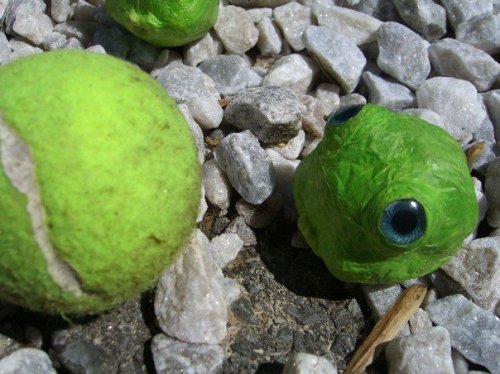
Frogfish puzzled by tennis ball. Learning.
What is unschooling? What do we do on a daily basis? How does my daughter learn if she isn’t taught or isn’t forced to do homework? Is it legal? These are only a few of the questions we get about unschooling.
There are many different kinds of unschooling, as each family adapts the general method to their specific family culture and comfort levels. Overall, unschooling means using everyday life as one’s curriculum, one’s basis for learning. We don’t spend time on homework (although on occasion, we do “play” school, and believe me, it’s odd to hear a child beg for math problems or a spelling test), and I don’t teach in any traditional sense, as in a hierarchical “I am the teacher you must obey!” manner. When learning opportunities come up, and they do quite frequently, we learn. Every interaction in life can be approached as a learning opportunity.
I enjoy learning quite a bit myself, and as an adult, when I get interested in something, I learn all I can about it, from books, people, practical experience, and any other resources I can find. This is unschooling. Just because I am out of school doesn’t mean I don’t enjoy learning! It’s the same kind of process my daughter uses in educating herself, with my help, of course.
But what do we do on a daily basis? We live life! As a dedicated unjobber, I work sporadically, making just enough money to support my daughter and myself, and we spend the rest of our time as members of our community. In nice weather, we spend a lot of time in our garden and outside. We hang out with friends, help on each others’ projects, do house repairs, go to the park, read books, play games—anything and everything we want to do—because we are blessed to have the time and motivation to do it.
Now with all that goofing off, you might think that learning doesn’t happen. Actually, the best kind of learning happens, because it’s natural, and it totally relates to matters at hand. To give you an idea of how unschooling works, I’ll fill you in on what my daughter did just this week.
On Sunday, our traditional potluck day, Kid Khalila is at her dad’s house. This week, we and our local friends all hung out with some out of town friends who were stopping through on a spring break trek out west. They came in a veggie oil car, so KK learned how to cook up veggie oil and filter it. She learned all about how the car works with veggie oil vs. gasoline. Later, we tramped around in the woods and walked around in our neighborhood, practicing backyard tourism at its finest. When we got back to my house, KK saw the altar I had set up for our spring equinox celebration, and we talked about why and how that is important, plus what the symbols used mean (such as pomegranate seeds).
On Monday, Kid Khalila goes to the local YMCA for homeschool classes. These are mostly, for her, fun classes that provide social time with a variety of age groups of other homeschooled kids. She goes to an art class, followed by swimming class. After swimming class is free time in the pool, and we generally stick around and eat lunch with a pile of kids. For some reason, my daughter is one of the popular kids, and other kids argue over getting to sit by her. She does not know how to handle this, and my shy unfriended kid self has not much advice for her there! I was never popular! By Monday evening, KK had read two two-hundred-page novels.
On Tuesday, a gorgeous weather kind of day, KK played outside for quite a while. She collected bugs and worms, played in the mud (oh, glorious mud!) and water, and did tricks on her rope swing for hours. We were sitting on the porch, chilling and talking about the meanings of words. I told her I just learned that the word “man” originally meant “woman” in Sanskrit, while the word “wer” meant man. A werewolf, then, is a manwolf, but a manwolf is a womanwolf! We agreed it was weird that a word like man could come to mean its opposite. I started talking about the words apocalypse and revelation, and how those words used to scare the bejeezus out of me when I was a kid, but now they make me feel free. Why? I grew up with my grandparents, who were fundamentalists, and we used to have bible study and prayer each evening before bed. Occasionally, we would read from the book of Revelations, and the Four Horsemen of the Apocalypse would scare me, but not as much as hearing about the world being consumed by fire.
After an odd look from my daughter, like who would really take something like that seriously, I told her about the Cold War. I’m not sure she had ever heard the words capitalism and communism. I explained that capitalism is the economic system of the United States, where everyone must work and exchange the money they receive to pay for food and shelter. Communism was the economic system of the Soviet Union (wow, that’s an antique place name!), where the government held all the land and money and everyone shared. She thought that sounded good! Well, sure, except that governments tend to collect power and become filled with corruption. “What’s cor-rup-tion, Mama?” Corruption, dear Kid Khalila, is where people at the top take the power and the money and do anything and everything they can to keep themselves in that place. It doesn’t matter what kind of government or economic system you live under; it’s corrupt. That’s just the nature of power. That’s just how it works.
Foreclosures can put dream homes in reachThe Politics of Wood Heating
No comments:
Post a Comment